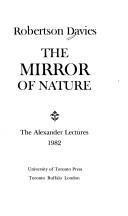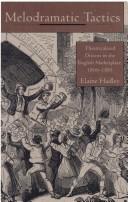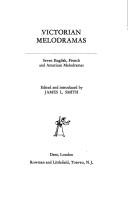| Listing 1 - 10 of 11 | << page >> |
Sort by
|
Book
Year: 1965 Publisher: London: Jenkins,
Abstract | Keywords | Export | Availability | Bookmark
 Loading...
Loading...Choose an application
- Reference Manager
- EndNote
- RefWorks (Direct export to RefWorks)
Book
ISBN: 1108595871 1108606113 1316155870 Year: 2018 Publisher: Cambridge : Cambridge University Press,
Abstract | Keywords | Export | Availability | Bookmark
 Loading...
Loading...Choose an application
- Reference Manager
- EndNote
- RefWorks (Direct export to RefWorks)
This newly commissioned series of essays by leading scholars is the first volume to offer both an overview of the field and also current emerging critical views on the history, form, and influence of English melodrama. Authoritative voices provide an introduction to melodrama's early formal features such as tableaux and music, and trace the development of the genre in the nineteenth century through the texts and performances of its various sub-genres, the theatres within which the plays were performed, and the audiences who watched them. The historical contexts of melodrama are considered through essays on topics including contemporary politics, class, gender, race, and empire. And the extensive influences of melodrama are demonstrated through a wide-ranging assessment of its ongoing and sometimes unexpected expressions - in psychoanalysis, in other art forms (the novel, film, television, musical theatre), and in popular culture generally - from the nineteenth to the twenty-first century.
Book
Year: 1965 Publisher: London : H. Jenkins,
Abstract | Keywords | Export | Availability | Bookmark
 Loading...
Loading...Choose an application
- Reference Manager
- EndNote
- RefWorks (Direct export to RefWorks)
English drama --- Melodrama, English --- History and criticism.
Book
ISBN: 1474465102 1474439551 Year: 2019 Publisher: Edinburgh : Edinburgh University Press,
Abstract | Keywords | Export | Availability | Bookmark
 Loading...
Loading...Choose an application
- Reference Manager
- EndNote
- RefWorks (Direct export to RefWorks)
This pioneering edition provides access to some of the most popular plays of the nineteenth century. Characterised by exhilarating plots, large-scale special effects and often transgressive characterisation, these dramas are still exciting for modern readers. This anthology lays the foundation for further scholarly work on sensation drama and focuses public attention on to this influential and immensely popular genre. It features five plays from writers including Dion Boucicault and Mary Elizabeth Braddon. These are supported by a substantial critical apparatus, which adds further value to the anthology by providing rich details on performance history and textual variants. The critical introduction situates the genre in its cultural context and argues for the significance of sensation drama to shifting theatrical cultures and practices.
English drama --- Melodrama, English --- Sensationalism in literature --- 1800-1899
Periodical
Year: 1966 Publisher: Mainz Wien B[ernhard] Schott's Söhne Universal Edition
Abstract | Keywords | Export | Availability | Bookmark
 Loading...
Loading...Choose an application
- Reference Manager
- EndNote
- RefWorks (Direct export to RefWorks)
Songs (High voice) with instr. ensemble --- Scores --- Songs with instr. ensemble --- Melodrama [English ] --- Melodrama [German ]

ISBN: 0802065368 Year: 1983 Volume: 1982 Publisher: Toronto University of Toronto Press
Abstract | Keywords | Export | Availability | Bookmark
 Loading...
Loading...Choose an application
- Reference Manager
- EndNote
- RefWorks (Direct export to RefWorks)
English drama --- Melodrama, English --- Theater --- History and criticism. --- History --- Melodrama --- Mélodrame --- Mélodrame --- Théâtre anglais --- Théâtre --- History and criticism --- Histoire et critique --- Histoire
Book
ISBN: 0900406631 Year: 1975 Publisher: London
Abstract | Keywords | Export | Availability | Bookmark
 Loading...
Loading...Choose an application
- Reference Manager
- EndNote
- RefWorks (Direct export to RefWorks)

ISBN: 0804724032 Year: 1995 Publisher: Stanford (Calif.) : Stanford university press,
Abstract | Keywords | Export | Availability | Bookmark
 Loading...
Loading...Choose an application
- Reference Manager
- EndNote
- RefWorks (Direct export to RefWorks)
Dissenters in literature. --- English drama --- English literature --- Literature and society --- Melodrama, English --- Social problems in literature. --- Theater and society --- History and criticism. --- History

ISBN: 0874717671 9780874717679 0460101935 9780460101936 Year: 1976 Publisher: London : Dent,
Abstract | Keywords | Export | Availability | Bookmark
 Loading...
Loading...Choose an application
- Reference Manager
- EndNote
- RefWorks (Direct export to RefWorks)
Drama --- Théâtre --- Théâtre --- Melodrama, English --- Melodrama, French --- Melodrama, American --- Melodrama --- CDL --- 792 --- Drama, Modern --- Dramatic music --- Theater --- American melodrama --- American drama --- French melodrama --- French drama --- English melodrama --- English drama
Book
ISBN: 0821444832 9780821444832 9780821420850 0821420852 0821426052 Year: 2014 Publisher: Athens Ohio University Press
Abstract | Keywords | Export | Availability | Bookmark
 Loading...
Loading...Choose an application
- Reference Manager
- EndNote
- RefWorks (Direct export to RefWorks)
"Melodrama, as an aesthetic, has long been criticized for its reliance on improbable situations and overwhelming emotion. These very aspects, however, made it a useful and appealing literary mode for British imperial propagandists in the late nineteenth century. Though stage melodrama may have been declining in prominence, the melodramatic style influenced many late-Victorian genres outside of the theater-for example, imperialist ballads, detective novels, travel narratives, and romances-and developed a complicated relationship with British imperial discourse. Melodramatic Imperial Writing: From the Sepoy Rebellion to Cecil Rhodes locates melodrama within a new and considerably more complicated history of British imperialism: beyond its use in constructing imperialist fantasies or supporting unjust policies, the melodramatic style also enabled writers to upset narratives of British imperial destiny or racial superiority. This book examines works by both canonical and lesser-known authors writing after the Sepoy Rebellion, including Wilkie Collins, Marie Corelli, Charles Dickens, H. Rider Haggard, W. E. Henley, Rudyard Kipling, Olive Schreiner, and Robert Louis Stevenson, and encompasses representations of British imperialism from India, to South Africa and the South Seas"--
LITERARY CRITICISM / European / English, Irish, Scottish, Welsh. --- Imperialism in literature. --- Literature and society --- Melodrama, English --- English prose literature --- Literature --- Literature and sociology --- Society and literature --- Sociology and literature --- Sociolinguistics --- English melodrama --- English drama --- History. --- History and criticism. --- Social aspects
| Listing 1 - 10 of 11 | << page >> |
Sort by
|

 Search
Search Feedback
Feedback About UniCat
About UniCat  Help
Help News
News